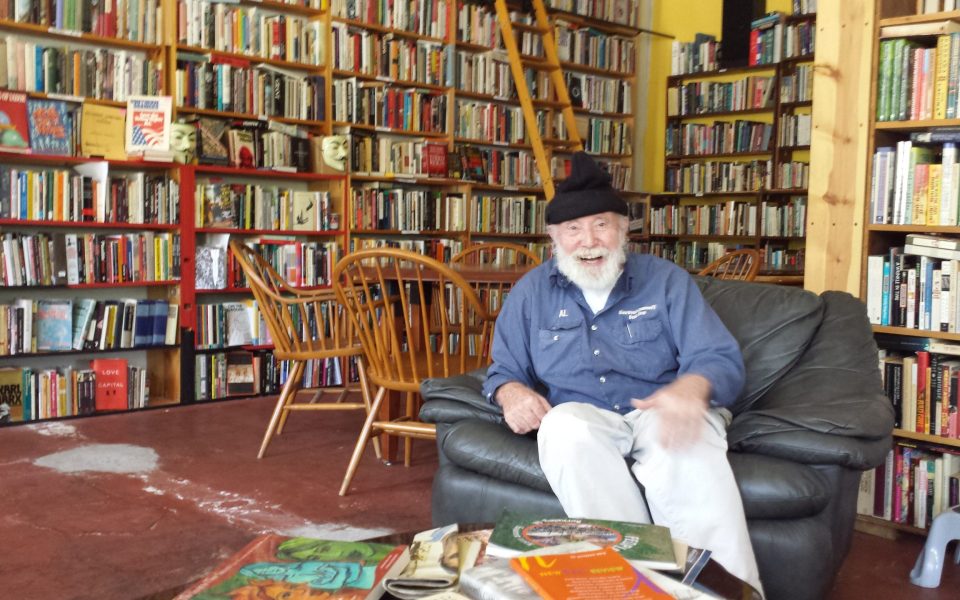The lights are out at Glenwood Coffee & Books, as they are on most afternoons, and the door is wide open when the weather permits. On Wednesdays they don’t use any electricity at all, the kind of quietly subversive act for which the store’s proprietor, Al Brilliant, has become known.
Gabe Barboza, a partner in the enterprise, pecks away at an IBM Selectric typewriter by the sunlit window: a poem, one he will eventually commit to newsprint which will then be hand bound by Rosemary Sandifer, the third principal, with cardboard and a needle and thread.
They’ll make 100 of them, put them on the shelves with the scholarly and whimsical tomes of Brilliant’s extended humanities collection, everything from Vonnegut to Voltaire, and sell them for a buck apiece under the banner of Lumpish Press.
Barboza spells out the deal.
“All books are a dollar,” he says. “All books are on newsprint. All books are hand-sewn instead of glued. And we love unauthorized art and unauthorized behavior.”
It began as a discussion at the bookstore, of course. Barboza dropped out of college to follow the path of the autodidact, taking his knowledge from Brilliant’s collection of books and from life itself.
“I don’t think I have any right to tell someone not to get an MFA,” he says now. “What I do think, and what Lumpish Press thinks, is that artists should be artists, teachers should be teachers, and students should be students.
“Can you teach art?” he asks the room, and Brilliant, from an easy chair by the stacks, chimes in.
“I don’t know what that means,” he says.
They took as an influence the Catholic Worker newspaper, an 80-year-old social-justice monthly that still costs just a penny per copy. They borrowed Marx’s term for the simple, unenlightened masses — lumpenproletariat — and gave it a Yiddish twist to create Lumpish Press. Barboza and Sandifer have contributed much of the material themselves thus far; Sandifer is writing a food journal, documenting recipes built from Dumpster-dived ingredients and Barboza has a pocket notebook of short poems he’s written in red ink.
Another contributor is Graham Holt, a Greensboro attorney who is writing a novel. Holt occasionally contributes to TCB. But the point is that great writing can come from anyone who casts himself in the role of artist.
“We want an unformed press,” Brilliant says, “but an informed press.”
There is no website or Twitter feed, no Facebook page for Lumpish Press, no Amazon.com portal or even a working phone number. Its only Google presence will likely be this very article.
“It’s a subversion of the commodification of culture,” Brilliant says softly from his chair. “We’re hoping to keep the television cameras off our backs. We don’t want to be spoiled by our success.”
And they say it’s a backlash against what they see as the elitist nature of contemporary literature.
Brilliant tells a story of a road trip he took with an acquaintance who had a creative writing MFA.
“I finally got ahold of one of these guys,” Brilliant says. “I asked him the $64 question: ‘My problem with the MFA writing is that I fail to find any meaning in any of the writing,’ That was my criticism.
“And this fucker turned and said to me, ‘Al, what is the meaning of “meaning?”’
“What a fucking wiseguy.”
Join the First Amendment Society, a membership that goes directly to funding TCB‘s newsroom.
We believe that reporting can save the world.
The TCB First Amendment Society recognizes the vital role of a free, unfettered press with a bundling of local experiences designed to build community, and unique engagements with our newsroom that will help you understand, and shape, local journalism’s critical role in uplifting the people in our cities.
All revenue goes directly into the newsroom as reporters’ salaries and freelance commissions.

 ©
©

Leave a Reply